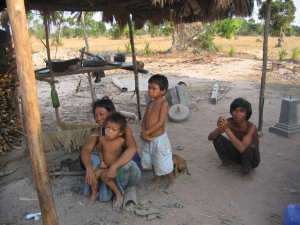In the late 1800’s the whole Mekong Delta, which included Cambodia, came under French control until World War 2, when the country was occupied by the Japanese. When the war came to an end in 1945 Cambodia hoped for independence, but was not until 1954 that full independence from France was granted. King Sihanouk was monarch from 1945, but in 1955 he abdicated from the throne. He installed his father as king, and created the “Peoples Socialist Community Party” to fight the general elections. His party won, and communist opposition, known as the “Khmer Rouge”, fled to the countryside to avoid arrest.
As the war in Vietnam progressed, Cambodia publicly declared neutrality, whilst allowing Vietnamese soldiers on Cambodian soil. This changed when in 1969 Sihanouk began negotiating with the US Government. US forces started bombing the Vietnamese on Cambodia’s eastern side, killing and maiming hundreds of Cambodian civilians in the process.
With the country in disarray the Khmer Rouge regrouped, and in April 1975 they marched on Phnom Penh, thus gaining control of Cambodia. The Khmer Rouge was a Communist party, controlled by Pol Pot, which tried to transform the country into an agrarian collective, eradicating life as it had been known before. The entire population of Phnom Penh was moved into the countryside and forced to work as peasants. At the same time the mass murder of educated people, intellectuals, doctors, teachers, and their families was carried out under the orders of Pol Pot. The regime continued until 1979 when Vietnam took control, by which point it is estimated that three million Cambodians had died. Pol Pot and his supporters fled to the Thai border and continued to wage war against the reigning government until 1998, when Pol Pot died.
Vietnam occupied Cambodia until 1989, and in 1991 the Paris Peace Accord granted power to the “United Nations Transitional Authority in Cambodia” to organise and operate fair elections, which took place in 1993.
The constitution proclaims a liberal, multiparty democracy in which powers are devolved to the executive, the judiciary and the legislature. However, there is no effective opposition to the Prime Minister Hun Sen, who has been in power since 1985
After decades of war, Cambodia currently has an extreme demographic imbalance; more than 50% of its people are 20 years old or younger. Cambodia still has few health professionals or academics, services are poor and there is great reliance on international aid. The countryside lacks basic infrastructure and 75% of the population work in subsistence farming.


















